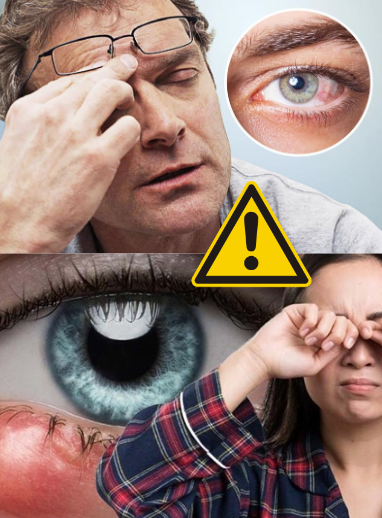
Your eyes are like silent messengers—they rarely shout when something’s wrong. Instead, they whisper. A little blur here, a flicker of light there, maybe a dryness you brushed off. But what if those are your eyes trying to tell you something more serious?
Here are 10 eye-related warning signs that might seem minor but could signal deeper issues with your vision or overall health. Let’s dive in, one blink at a time.
1. Frequent Blurry Vision? Don’t Ignore It
Blurry vision isn’t just an inconvenience—it’s a red flag. If you find yourself squinting to read your phone, struggling with street signs, or your eyes feel like they’re working overtime, that’s your cue. While it could be simple nearsightedness or farsightedness, it might also hint at diabetes, high blood pressure, or early-stage cataracts. The bottom line? Persistent blur = get your eyes checked.
2. Dry, Itchy Eyes That Never Seem to Go Away
We all rub our eyes now and then. But if your eyes constantly feel like sandpaper, it might not just be tiredness. Chronic dryness can be caused by digital eye strain, allergies, autoimmune diseases (like Sjögren’s syndrome), or even meibomian gland dysfunction. If artificial tears aren’t cutting it, your eyes might need medical backup.
3. Sudden Flashes of Light or Floaters? Time to Take It Seriously
Seeing flashes or a sudden shower of floaters (those little squiggly things drifting in your vision) can be more than annoying—they can be dangerous. These symptoms may point to a torn or detached retina, which is an emergency. Don’t wait it out. If it appears suddenly and worsens, head straight to an eye specialist.
4. Red or Bloodshot Eyes That Stick Around
Red eyes after a long night? Normal. Red eyes every day, for no clear reason? That’s another story. Chronic redness can be a sign of eye infections, glaucoma, uveitis, or even subconjunctival hemorrhage (a burst blood vessel). Some conditions can lead to permanent vision loss if untreated, so don’t just hide them behind sunglasses.
5. Eye Pain or Pressure That’s Hard to Explain
Pain is your body’s way of waving a red flag—and your eyes are no exception. Persistent eye discomfort, especially when paired with nausea or blurred vision, could signal glaucoma, corneal abrasions, or even optic neuritis. Eye pain is never something to brush off. It’s your eyes saying “help!”
Video : 10 Warning Signs Your EYES are TELLING YOU About Your HEALTH.
6. Double Vision That’s Not From Being Tired
Seeing two of everything? That’s not normal—even if it only happens occasionally. Double vision could be linked to issues with the eye muscles, the nerves that control them, or even the brain itself. Conditions like stroke, aneurysms, or multiple sclerosis sometimes show up first in your vision.
7. Difficulty Seeing at Night or in Low Light
Do you avoid driving at night because everything looks fuzzy or dim? Struggling in low-light environments might be an early symptom of cataracts, vitamin A deficiency, or worsening myopia. Your eyes are supposed to adjust to darkness, so if they’re not keeping up, something’s off.
8. Light Sensitivity (Photophobia)
Do bright lights make you wince or tear up more than usual? That might be photophobia, and it’s not just about being “sensitive.” It could mean you’re dealing with inflammation inside the eye (like uveitis), migraines, or corneal irritation. If sunglasses are your new best friend indoors, your eyes are asking for help.
9. Difficulty Focusing on Objects Up Close
If you’re holding your phone at arm’s length or constantly adjusting your reading material, your near vision might be slipping. This is common as we age (presbyopia), but it can also indicate lens issues or uncorrected farsightedness. Regular eye exams can sort it out before the headaches and eye strain kick in.
10. Frequent Headaches Around the Eyes
You might not link your headaches to your vision—but you should. Eye strain, uncorrected vision problems, and even glaucoma can all cause headaches, especially around the temples or behind the eyes. If your eyes feel like they’re doing too much heavy lifting, they probably are.
Video : Seniors: Eat THESE 3 Seeds to Protect Your Eyes & Retina Naturally
Conclusion: Don’t Let Your Eyes Suffer in Silence
Your eyes might not scream, but they definitely speak. Whether it’s a subtle shift in vision, persistent dryness, or unexplained pain, every sign matters. Don’t wait until you can’t see the problem—address it while it’s still whispering.
Regular eye exams, screen breaks, proper lighting, hydration, and a healthy diet rich in antioxidants can all support long-term eye health. Listen to your eyes—they’re the windows not just to your soul, but to your well-being too. 👁️✨


